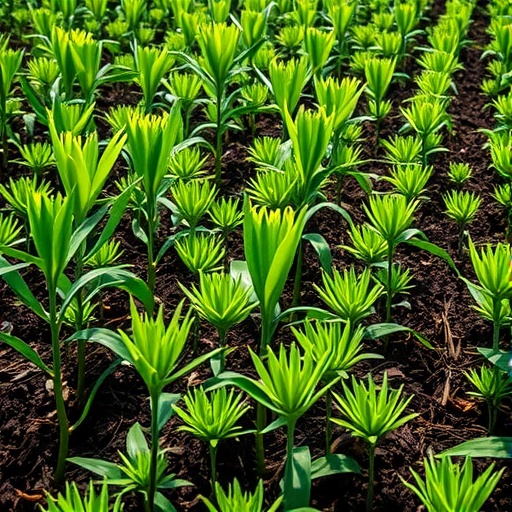As climate patterns become increasingly erratic due to global warming and other anthropogenic influences, the pressing challenge of maintaining agricultural sustainability has come to the forefront of scientific inquiry. This urgency is comprehensively examined in the recent narrative review by Sharma, Nwosu, Singh, and their colleagues, which intricately discusses strategies to enhance crop resilience and overall system efficiency in the face of unpredictable atmospheric changes. Their analysis underscores the pivotal role that agriculture plays in our world’s ecology and economy and suggests integrated approaches that can be implemented to mitigate the adverse effects of climate change on food production.
The research articulates the complex interplay between atmospheric changes and agricultural productivity. As temperatures rise and precipitation patterns shift, crops face new threats in the form of droughts, pests, and diseases. Farmers, dependent on stable climatic conditions, find themselves navigating an increasingly volatile environment that can drastically alter their yields. The authors suggest that understanding these dynamics is critical for developing robust agricultural systems capable of adapting to change.
One of the primary strategies highlighted in the review is the adoption of climate-smart agricultural practices. This includes techniques that optimize resource use while minimizing the environmental footprint. For instance, conservation tillage, crop rotation, and agroforestry can improve soil health, enhance biodiversity, and increase resilience against climatic shocks. By employing such methods, farmers can not only sustain their yields but also contribute positively to the ecosystem.
The significance of genetic diversity in crop species cannot be overstated, as explored in the article. With a diverse gene pool, crops are more likely to withstand the stresses posed by varying climatic conditions. This perspective advocates for the preservation and enhancement of traditional varieties alongside modern breeding techniques. By harnessing the strengths of both, researchers can develop hybrid crops that are resilient to heat and drought while maintaining nutritional quality.
Innovative technologies are also at the forefront of enhancing agricultural resilience. The review sheds light on the integration of artificial intelligence and data analytics in farming practices. By utilizing predictive models that analyze weather patterns and soil conditions, farmers can make informed decisions on when to plant or harvest and how to allocate resources effectively. This technological shift could revolutionize farming, making it not only more efficient but also sustainable in the long term.
Water management strategies are another critical focus of the research. As climate change exacerbates water scarcity, efficient irrigation techniques must be prioritized. Drip irrigation, rainwater harvesting, and moisture-retention practices can significantly reduce water usage while maximizing crop yield. The authors argue that investing in smart irrigation technologies will be vital for adapting to an increasingly uncertain moisture availability scenario.
The interconnection between agriculture and social systems is another key theme in this narrative review. Farmers are often the first to experience the detrimental impacts of climate change and their response can have cascading effects on local and global food security. Building community resilience through support programs, knowledge sharing, and cooperative agricultural schemes can empower farmers to adapt effectively. Such social structures are essential to foster collaboration and collective solutions to agri-environmental challenges.
Moreover, policy frameworks play a crucial role in facilitating sustainable agricultural practices. The review underscores the necessity for governments to develop supportive legislation that encourages sustainable farming methods and invests in research and development. By prioritizing agricultural sustainability within national and international agendas, policymakers can help secure food systems against future climatic unpredictability.
The narrative further explores the concept of sustainable intensification, which seeks to increase productivity without unwarranted environmental degradation. This approach advocates for a holistic view of agriculture, where the ecosystem’s health is considered alongside crop yields. The balance between productivity and sustainability will ultimately determine the future of global food systems as we confront the reality of climate change.
Ultimately, the review by Sharma and colleagues serves as a clarion call for urgent action in agricultural practices amidst climate uncertainties. It emphasizes that the strategies discussed are not simply theoretical but necessitate immediate implementation to ensure resilient food systems. The scientific community, policymakers, and farmers must unite in pursuit of innovative and sustainable solutions to withstand the impending challenges posed by atmospheric changes.
In conclusion, as the implications of climate change bear down on agriculture worldwide, this comprehensive narrative review provides a roadmap for resilience. By integrating diverse strategies—from genetic diversity and artificial intelligence to sustainable practices and supportive policies—stakeholders in agriculture can bolster their defenses against the unpredictable shifts in our climate. The future of food security relies not only on our immediate actions but also on our long-term commitment to sustainability and ecological balance.
Subject of Research: Agricultural sustainability under unpredictable atmospheric changes.
Article Title: Agricultural sustainability under unpredicted atmospheric changes—strategies to enhance crop resilience and system efficiency: a narrative review.
Article References:
Sharma, R.K., Nwosu, N., Singh, L. et al. Agricultural sustainability under unpredicted atmospheric changes—strategies to enhance crop resilience and system efficiency: a narrative review. Discov Agric 3, 124 (2025). https://doi.org/10.1007/s44279-025-00287-4
Image Credits: AI Generated
DOI: 10.1007/s44279-025-00287-4
Keywords: Agricultural sustainability, climate change, crop resilience, smart agriculture, water management, policy frameworks.




